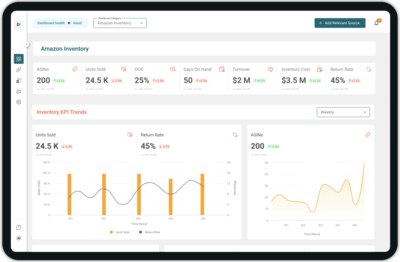Sellers are often confused while deciding which channel is suitable for selling their product or spending their marketing budget. To enhance the business and minimize losses, sellers must understand the market demand and supply trends. Understanding trends will help sellers maximize revenue and offer a smooth customer experience. Hence, it becomes necessary for companies to tally the data from several business tools. Such as mobile apps, inventory management software, payment gateways, CRMs, and customer support platforms. Above all, sellers must consolidate the tallied business data to a data warehouse like Amazon Redshift for gaining deeper insights. The data migration is simple and free from coding hassles. Replicate your Tmall data to Amazon Redshift to enhance your marketing campaigns and integrate it with analytics, engagement, billing, customer support, and sales data to estimate your true ROI.
Why integrate TMall into Amazon Redshift
TMall is a Chinese e-commerce e-retail website. The website operates in several countries like India, Australia, and China. Let’s take a simple example of a TMall to understand data integration’s importance. Suppose a seller sells his brand products in India, China, and Australia. When the seller operates in various countries, his TMall account will generate a sizable amount of data. This data will generate from multiple data silos. Like inventories, marketing, payment gateways, logistic channels, and target audience in each country. Secondly, to keep track of the data, the seller will also use various software. Now, for example, suppose to calculate the overall expense, the seller will use the following formula:
Profits/Losses = Sales – Expenses.
Thus, the seller will collect the expense data from the following areas. Such as marketing data from Facebook ads, Google ads, and Inventory data from inventory management software like QuickBooks and Olabi. And other expense data from account software like Zoho Books and Freshbook for each country. Therefore, it will be a challenging task to separately pull data for each region. Secondly, also analyze all the expense data together with sales data and estimate the profit. This task will consume time, be very costly. Moreover, as the data obtained is not real-time, there will be a lack of accuracy in the calculation and analysis. Thus, sellers must consolidate their e-commerce website’s data into one platform in the data warehouse like Amazon Redshift. This will simplify the process and optimize business performance. Daton is a powerful ETL tool that effortlessly transfers data from TMall to Amazon Redshift.
TMall Overview
TMall is a Chinese e-commerce website. Alibaba group manages this website. This platform provides a business to consumer (B2C) e-retail store. And lets international sellers and local Chinese brands sell their products to customers in Greater China. TMall is currently dealing in developing brand awareness, helping the associated sellers in customer acquisition and retention. In 2014, Alibaba launched a cross-border marketplace called TMall Global. This platform enables all international brands to sell their products directly to Chinese customers. Alipay by Alibaba group is the prominent payment gateway used by TMall. As of now, around 50000 sellers work with TMall.
Amazon Redshift Overview
Amazon Redshift is the most well-known data warehouse to provides a cloud-native, petabyte-scale service. The software offers a query engine for all users permitting SQL based querying. It also provides a host of business intelligence tools to connect with the service. Amazon Redshift is based on a scalable infrastructure. This data warehouse supports big data and massive workloads. Above all, the powerful management console enables connections from any SQL client. Amazon Redshift service also helps REST APIs permits developers to work in real-time with simple API calls. It is compatible with several Business Intelligence and visualization tools.
How to replicate TMall to Amazon Redshift
You can replicate TMall to the Amazon Redshift warehouse in two ways.
Build a data pipeline
This process consumes a lot of time and workforce and needs much experience. In such a process, there are more chances of making errors. You need to extract data using TMall APIs & then connect it properly with the Amazon Redshift data warehouse.
Use Daton to integrate TMall & Amazon Redshift
Use Daton to integrate TMall & Amazon Redshift is the quickest and most effortless method to save your efforts and time. Leveraging an eCommerce data pipeline like Daton most importantly accelerates and simplifies the time it takes to build automated reporting. Above all, configuring the data replication on Daton only takes a few minutes and a few clicks. You won’t require any code or manage any infrastructure, yet they can access their TMall data in a few hours.
Daton is easy and simple to use. The interface permits analysts and developers to use UI elements to configure data replication from TMall data into Amazon Redshift.
Daton takes care of:
- Authentication
- Rate limits,
- Sampling,
- Historical data load,
- Incremental data load,
- Table creation, deletion and reloads,
- Refreshing access tokens,
- Notifications
And there are many more essential features to help analysts. So that they can focus more on data analysis rather than worry about the data migration.
Steps to Integrate TMall with Daton

- Sign in to Daton
- Select TMall from the Integrations page
- Provide Integration Name, Replication Frequency, and History. The integration name cannot be changed later as it would be used in creating tables for the integration.
- You will be redirected to the TMall login page for authorizing Daton to extract data periodically.
- Post successful authentication, you will be prompted to choose from the list of available TMall accounts
- Select the required tables from the available list of tables
- Then select all required fields for each table
- Submit the integration
Sign up for a trial of Daton Today
Here are more reasons to explore Daton for TMall to Amazon Redshift Integration.
- Faster Integration of TMall to Amazon Redshift– TMall to Amazon Redshift is one of the integrations Daton can handle very fast and seamlessly. By following a few steps, you can easily connect TMall to Amazon Redshift.
- No Effort & Maintenance: Daton takes care of all the data replication processes and infrastructure automatically once you sign up for a Daton account and configure the data sources. You don’t need to manage any infrastructure or write codes.
- You get an incredibly friendly customer support team who ensure that you leave the data engineering to Daton and focus on analysis and insights.
- Daton is an Enterprise-grade data pipeline which you get at an unbeatable price to help your business become data-driven. Get started today for just $10 with a single integration and scale up as your demands increase.
- Robust Scheduling Options: allows you to schedule jobs based on their requirements using a simple configuration step.
- Daton supports popular cloud data warehouses like Snowflake, Amazon Redshift, Oracle Autonomous Data Warehouse, PostgreSQL and more.
- Flexible loading options allows optimizing data loading behaviour to maximize storage utilization and ease of querying.
- Enterprise-grade encryption gives your peace of mind.
- Support for 100+ data sources: In addition to TMall, Daton can extract data from various resources like Databases, Sales and Marketing applications, Analytics and Payment platforms. Daton will ensure that all useful data can be transferred to Amazon Redshift for generating relevant insights.
For all sources, check our data connectors page.
Other Articles by Saras,














